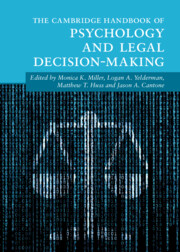Book contents
- The Cambridge Handbook of Psychology and Legal Decision-Making
- Cambridge Handbooks in Psychology
- The Cambridge Handbook of Psychology and Legal Decision-Making
- Copyright page
- Dedication
- Contents
- Figures
- Tables
- Editors
- Contributors
- Part I Introduction Chapters
- Part II Pretrial Phase Decision-Making
- Part III Trial Phase Decision-Making
- 20 Social Cognition of Jury Decision-Making
- 21 Beliefs About Juror Decision-Making and the Jury Process
- 22 Deciphering Directives
- 23 Decisions Surrounding the Use of Expert Testimony
- 24 Legal and Extralegal Factors that Affect Jurors’ Decisions
- 25 Decisions Regarding Insanity
- 26 Decision-Making in the Shadow of Evidence Law
- 27 Decision-Making in Contested Divorce Child Custody Cases
- Part IV Postconviction Phase Decisions
- Part V Other Legal Decision-Making
- Part VI Perspectives from the Field
- Part VII Conclusion
- Index
- References
20 - Social Cognition of Jury Decision-Making
from Part III - Trial Phase Decision-Making
Published online by Cambridge University Press: 22 February 2024
- The Cambridge Handbook of Psychology and Legal Decision-Making
- Cambridge Handbooks in Psychology
- The Cambridge Handbook of Psychology and Legal Decision-Making
- Copyright page
- Dedication
- Contents
- Figures
- Tables
- Editors
- Contributors
- Part I Introduction Chapters
- Part II Pretrial Phase Decision-Making
- Part III Trial Phase Decision-Making
- 20 Social Cognition of Jury Decision-Making
- 21 Beliefs About Juror Decision-Making and the Jury Process
- 22 Deciphering Directives
- 23 Decisions Surrounding the Use of Expert Testimony
- 24 Legal and Extralegal Factors that Affect Jurors’ Decisions
- 25 Decisions Regarding Insanity
- 26 Decision-Making in the Shadow of Evidence Law
- 27 Decision-Making in Contested Divorce Child Custody Cases
- Part IV Postconviction Phase Decisions
- Part V Other Legal Decision-Making
- Part VI Perspectives from the Field
- Part VII Conclusion
- Index
- References
Summary
This chapter discusses the growing body of research that examines the social cognitive processes of jurors used when making verdict or sentencing decisions. This includes the empirical findings related to priming ideas and attitudes and impression formation. The chapter then discusses heuristics, or cognitive “shortcuts,” that jurors employ during their decision-making processes in trials and deliberations. For instance, there is a tendency for jurors to over-rely on dispositional attributions, stereotypes, and schemas. Cognitive biases that jurors are prone to, such as the hindsight bias, the outcome bias, and counterfactual thinking, will also be discussed in the context of evaluating evidence and making verdict decisions, along with the potential of debiasing techniques. Finally, jurors’ biases and prejudices regarding factors, such as race, gender, and religion, and how they relate to decision-making are examined. The chapter also addresses areas of social cognition that have not yet been explored in current research and provides recommendations for future directions.
- Type
- Chapter
- Information
- The Cambridge Handbook of Psychology and Legal Decision-Making , pp. 309 - 323Publisher: Cambridge University PressPrint publication year: 2024

